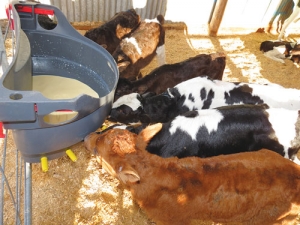Green Light for Fonterra's $3.2b Capital Return Scheme
Fonterra farmer shareholders have approved the mechanism for a $2/share capital return expected from the sale of its global consumer and associated businesses.
 Colin Guyton believes Fonterra should be producing the right amount of milk for the right profitability.
Colin Guyton believes Fonterra should be producing the right amount of milk for the right profitability.
Colin Guyton says for the first time since he’s been farming he didn’t receive a milk cheque in July, in common with almost everybody and a cause of stress and concern.
Dairy farmers must now keep an eye on others because some are vulnerable and may need help, he says. All the news he hears is negative.
“There hasn’t been a lot of positive stuff. All we get is negative stuff at the moment, some about how long this downturn will last. You hear rumours that interest rates will fall and that would be a positive move. My gut feeling is they will come down more but it’s still going to be pretty tight. [We have to] sharpen our pencils over costs, which were getting a bit out of hand.”
Guyton says New Zealand farmers were the envy of the world with their low cost production. But he and many others installing feeding systems now have higher costs. He’s not sure what effect the present low payout will have on the dairy industry, noting that a sudden upsurge in the GDT price could see people go back to the status quo.
“But I think Fonterra’s policy on growth growth growth may be wrong. We need to be producing the right amount of milk for the right profitability.
“Fonterra slightly led us astray…. I’m not suggesting this was deliberate but we were told China is growing and there’s huge gap with no milk and the next ten years will be great. All of sudden we have a milk lake they should have been able to see coming.”
But Guyton is complementary about the response and communication he’s received from Fonterra on issues he’s raised with chairman John Wilson, who personally emailed a response to him and arranged for someone from Fonterra to talk to him.
Pāmu has welcomed ten new apprentices into its 2026 intake, marking the second year of a scheme designed to equip the next generation of farmers with the skills, knowledge, and experience needed for a thriving career in agriculture.
One team with 43 head, including a contingent from Mid Canterbury, are reflecting on a stellar NZ DairyEvent.
Fonterra farmer shareholders have approved the mechanism for a $2/share capital return expected from the sale of its global consumer and associated businesses.
Trainees in the horticulture industry studying towards a certificate or diploma can now apply for Horticulture New Zealand's (HortNZ) 2026 Industry Training Scholarships programme.
OPINION: The first three Global Dairy Trade (GDT) auctions have been a morale booster for farmers.
Former Fonterra executive Alex Turnbull has been appointed CEO to lead all five Yili Oceania Business Division companies in New Zealand.
OPINION: Staying with politics, with less than nine months to go before the general elections, there’s confusion in the Labour…
OPINION: Winston Peters' tirade against the free trade deal stitched with India may not be all political posturing by the…